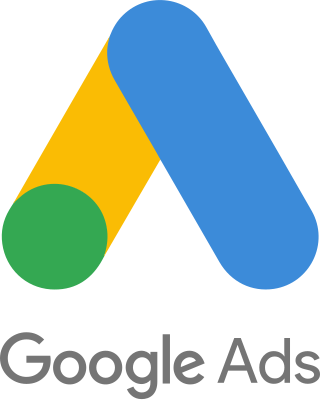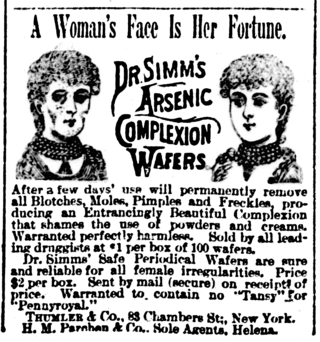
Advertising is the practice and techniques employed to bring attention to a product or service. Advertising aims to put a product or service in the spotlight in hopes of drawing it attention from consumers. It is typically used to promote a specific good or service, but there are wide range of uses, the most common being the commercial advertisement.
Google AdSense is a program run by Google through which website publishers in the Google Network of content sites serve text, images, video, or interactive media advertisements that are targeted to the site content and audience. These advertisements are administered, sorted, and maintained by Google. They can generate revenue on either a per-click or per-impression basis. Google beta-tested a cost-per-action service, but discontinued it in October 2008 in favor of a DoubleClick offering. In Q1 2014, Google earned US$3.4 billion, or 22% of total revenue, through Google AdSense. AdSense is a participant in the AdChoices program, so AdSense ads typically include the triangle-shaped AdChoices icon. This program also operates on HTTP cookies. In 2021, over 38.3 million websites use AdSense.

Google Ads is an online advertising platform developed by Google, where advertisers bid to display brief advertisements, service offerings, product listings, and videos to web users. It can place ads in the results of search engines like Google Search, mobile apps, videos, and on non-search websites. Services are offered under a pay-per-click (PPC) pricing model.

False advertising is the act of publishing, transmitting, or otherwise publicly circulating an advertisement containing a false claim, or statement, made intentionally to promote the sale of property, goods, or services. A false advertisement can be classified as deceptive if the advertiser deliberately misleads the consumer, rather than making an unintentional mistake. A number of governments use regulations to limit false advertising.
Online advertising, also known as online marketing, Internet advertising, digital advertising or web advertising, is a form of marketing and advertising that uses the Internet to promote products and services to audiences and platform users. Online advertising includes email marketing, search engine marketing (SEM), social media marketing, many types of display advertising, and mobile advertising. Advertisements are increasingly being delivered via automated software systems operating across multiple websites, media services and platforms, known as programmatic advertising.

Alcohol advertising is the promotion of alcoholic beverages by alcohol producers through a variety of media. Along with nicotine advertising, alcohol advertising is one of the most highly regulated forms of marketing. Some or all forms of alcohol advertising are banned in some countries. There have been some important studies about alcohol advertising published, such as J.P. Nelson's in 2000.

The Committee of Advertising Practice (CAP) is a British organisation responsible for the UK Code of Non-Broadcast Advertising, Sales Promotion and Direct Marketing, which is the main code of practice for self-regulation of the non-broadcast advertising industry in the UK.
The UK Code of Non-broadcast Advertising, Sales Promotion and Direct Marketing is the rule book for non-broadcast advertisements, sales promotions and direct marketing communications in the United Kingdom. It is written and maintained by the Committee of Advertising Practice (CAP) and administered by the Advertising Standards Authority (ASA). The 12th edition of the CAP Code came into force in September 2010.

Fast food advertising promotes fast food products and utilizes numerous aspects to reach out to the public.
BBB National Programs, an independent non-profit organization that oversees more than a dozen national industry self-regulation programs that provide third-party accountability and dispute resolution services to companies, including outside and in-house counsel, consumers, and others in arenas such as privacy, advertising, data collection, child-directed marketing, and more. The Center for Industry Self-Regulation (CISR) is BBB National Programs' 501(c)(3) non-profit foundation. CISR supports responsible business leaders in developing fair, future-proof best practices, and the education of the public on the conditions necessary for industry self-regulation.
Charlie's Group Limited is a New Zealand-based producer of beverage drinks. It is owned by the Japanese beverage company Asahi.

The Advertising Standards Authority (ASA) is the self-regulatory organisation of the advertising industry in the United Kingdom. The ASA is a non-statutory organisation and so cannot interpret or enforce legislation. However, its code of advertising practice broadly reflects legislation in many instances. The ASA is not funded by the British government, but by a levy on the advertising industry.
Advertising to children refers to the act of advertising products or services to children as defined by national laws and advertising standards.
Ad Standards is the advertising industry's non-profit self-regulating body created in 1957 to ensure the integrity and viability of advertising in Canada. The organization's members include major advertisers, advertising agencies, media organizations, and suppliers to the advertising sector. Some of the activities that the organization engages in are:

Meat & Livestock Australia (M&LA) is an independent company which regulates standards for meat and livestock management in Australian and international markets. Headquartered in North Sydney, Australia; M&LA works closely with the Australian government, and the meat and livestock industries. M&LA has numerous roles across the financial, public and research sectors. The M&LA corporate group conducts research and offers marketing services to meat producers, government bodies and market analysts alike. Forums and events are also run by M&LA aim to provide producers with the opportunity to engage with other participants in the supply chain.

The Advertising Standards Authority of South Africa was an independent entity organised and financed by members of the marketing communications industry of South Africa. Its purpose was to manage South Africa's voluntary, self-regulating system of advertising. The ASA worked with a variety of marketing communication industry stakeholders to ensure that advertising content in the country met the requirements of its Code of Advertising Practice and to control advertising content in the South African public's interest. The ASA of South Africa's Code of Advertising Practice was based on the Consolidated ICC Code of Marketing and Advertising Communication Practice prepared by the International Chamber of Commerce. Member organisations, including advertisers, advertising agencies, and the media agreed upon advertising standards in the ASA code and worked to effect the swift correction or removal of any advertising that failed to meet their agreed-upon standards.

The Advertising Standards Council of India (ASCI) is a voluntary self-regulatory organization of the advertising industry in India. Established in 1985, ASCI is registered as a non-profit company under section 25 of the Company Act.
The Australian Association of National Advertisers (AANA) is the national body for advertisers based in Sydney, Australia. The AANA represents the interests of organisations involved in Australia’s advertising, marketing and media industry.
Native advertising, also called sponsored content, partner content, and branded journalism, is a type of paid advertising that appears in the style and format of the content near the advertisement's placement. It manifests as a post, image, video, article or editorial piece of content. In some cases it functions like an advertorial. The word native refers to this coherence of the content with the other media that appear on the platform.
The Outdoor Media Association (OMA) is the national industry body that represents most of Australia's Out-of-Home (OOH) media display companies and production facilities, as well as some media display asset owners. It was first incorporated in 1939.









